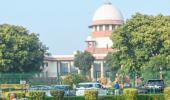'If in our cities, all urban bus transport services are free, then taxpayers are paying for it, or if electricity were to be made free, that's a huge cost to the rest of the people.'

Financing India's development requires a greater contribution from users of public goods and services, while ensuring affordable or free services for the needy sections, so that the burden of investing in the economy is not just borne by taxpayers and public borrowings that are essentially a levy on future generations, Finance Secretary Ajay Seth said.
In his first public remarks after assuming the top post in the finance ministry, Seth said the country needs to ramp up investments and productivity from all factors of production, and make smart trade-offs on competing demands and outcomes, given the limited domestic savings pool.
"We will get some money from outside, but not beyond a point. So who is going to finance the development?
"To my mind, there are only three sets of people -- the taxpayers or the next generation whom we can borrow from, or it is the rate payers.
"So far, by and large in our economy, it is the taxpayers or the next generation which have been financing development.
"The role of the rate payers is rather very, very nominal," the secretary said at a summit on Saturday, March 29, hosted by the SKOCH group.
Speaking to Business Standard later, he said that 'rate payers' was a reference to people who must pay appropriate user charges for public services.
"There will always be sections of our society that will have to be provided services at an affordable rate.
"Maybe some services will have to be given free because they are very important," he explained.
"When we use a transport service, we pay for the ticket. There may be some segments that may require support or a subsidised fare, but not everybody.
"If in our cities, all urban bus transport services are free, then the taxpayers are paying for it, or if electricity were to be made free, that's a huge cost to the rest of the people," Seth pointed out.
His remarks assume significance amid an increasing trend of political parties promising subsidised or free services to voters.
Seth also flagged divergences in states' approach to development, citing Uttar Pradesh that has maintained fiscal prudence and ramped up capex to 5 per cent of GSDP in its latest Budget, while many high-income states are spending just 23 per cent of GSDP into capital spends and still running into revenue deficits.
While he refrained from referring to the emerging trade tariff worries from the US' policy pivot under the Donald Trump administration, the secretary signaled that exports may not provide as much of a thrust to the Indian economy in coming years as the world is entering an 'era of uncertainty'.
"I don't see those uncertainties subsiding, at least in the medium term as nations today seem to be moving away from cooperation to more competition," he remarked.
Even as India is now the world's fifth largest economy, what matters for citizens is their per capita income level, and the distribution of the national income which has wide variations at present, Seth noted.
Moreover, even as India's purchasing power in the world has gone up from 4 per cent to about 8.5 per cent in 25 years, this needs to further double as it is home to 18 per cent of the world population, he pointed out.
Feature Presentation: Ashish Narsale/Rediff.com












 © 2025
© 2025